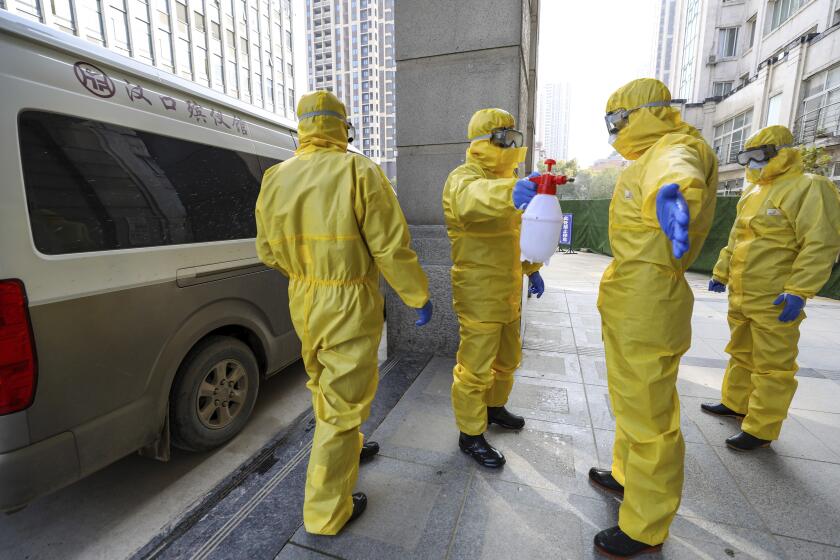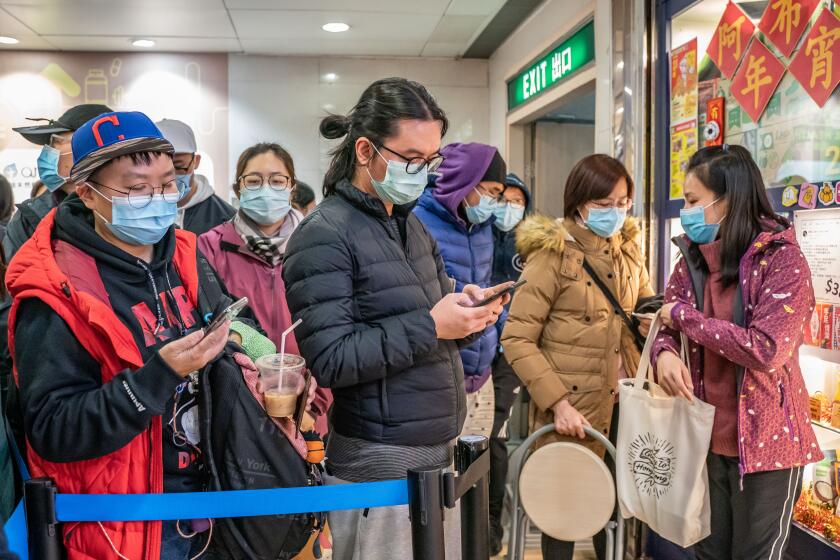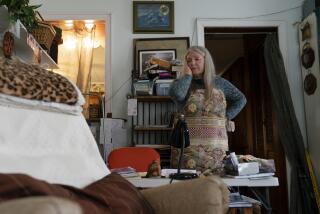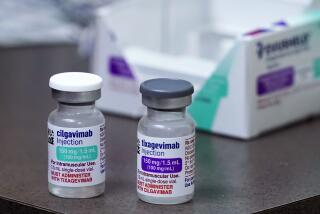Doctors fight coronavirus outbreak with drugs that target HIV, malaria and Ebola
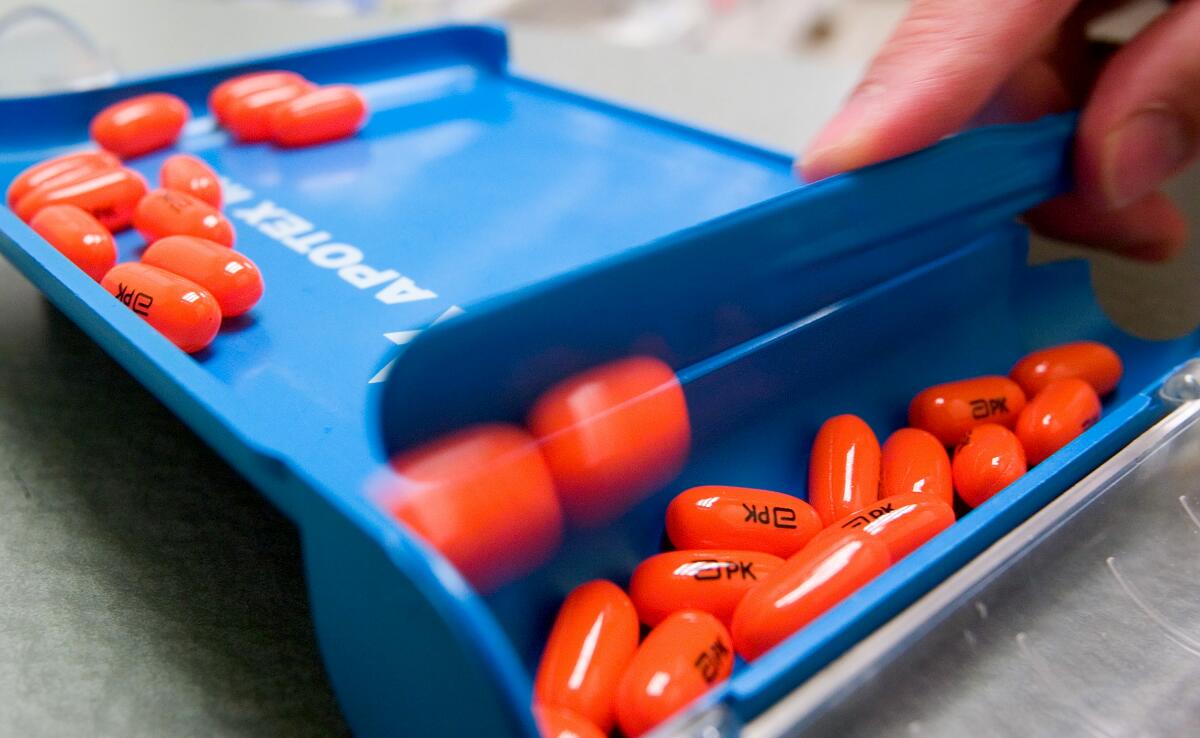
- Share via
As the scientific community scrambles to find a drug that can effectively treat patients sickened by the new coronavirus from China, doctors are trying some surprising remedies: medicines targeting known killers such as HIV, Ebola and malaria.
The respiratory disease, now known as COVID-19, has afflicted tens of thousands of people worldwide and killed more than 1,300. Yet “everyone agrees we don’t have a standard therapy for the novel coronavirus,” said Dr. Rajesh Gandhi, a professor of medicine at Harvard University.
Among the potential treatments is an HIV medication that may work to block an enzyme the virus needs to mature.
An unapproved medicine used to fight the Ebola virus is being tested in Chinese patients to see whether it can disrupt the new virus’ genetic material.
And a third drug, widely used around the globe to fight the parasite that causes malaria, is also being tried in China to see if it can slow infection by preventing the virus from infiltrating cells.
The evidence behind some of these medicines is flimsy, researchers acknowledged. But the strategy is not unprecedented.
An outbreak of a new, potentially deadly disease can make physicians want to try everything possible to save their patients, said Dr. Stanley Perlman, a professor of microbiology and immunology at the University of Iowa.
“It’s just so hard when you’re on the front line and your patient is sick and you want to do something,” Perlman said.
It’s the biggest medical mystery on the planet: Just how deadly is the new coronavirus from China?
Medications available in the United States have already gone through rigorous testing to prove they are not dangerous, eliminating the need to run costly human trials to assess safety in an emergency.
That said, officials generally look at the evidence surrounding the drugs and the virus to try to find a viable option.
“They usually cast a pretty wide net because they don’t know for any given virus what’s gonna work,” said Gandhi, the chair-elect of the HIV Medicine Assn.
In 2003, another coronavirus with no known treatment caused a global outbreak of severe acute respiratory syndrome, or SARS. The response involved testing a litany of drugs, including a combination of ritonavir and lopinavir, two antiretroviral medications used to fight HIV.
Early studies hinted that the medicines were effective in fighting the virus in patients. The combination, known by the brand name Kaletra, appears to work to stop enzymes called proteases from allowing the virus to mature and replicate. But the SARS outbreak — and the ability to robustly test treatments — all but disappeared in a little over a year.
Nine years later, another coronavirus caused Middle East respiratory syndrome, or MERS. That outbreak gave scientists another chance to test the HIV medication against this family of viruses, and a clinical trial is underway in Saudi Arabia.
Chinese doctors are now using Kaletra against COVID-19.
Despite the colossal efforts to contain the new coronavirus, scientists are quietly preparing for an increasingly likely outcome: A full-blown global pandemic.
A more unorthodox remedy being tested against the coronavirus in China is chloroquine.
The drug is intended to treat malaria, a condition caused by a parasite transmitted through a mosquito bite. A limited number of studies suggest the drug can work against SARS. In laboratory tests, it kept COVID-19 from spreading by blocking its method of infecting cells, according to a report last week in the journal Cell Research.
Scientists treating coronavirus patients are pairing treatment with research to test the effectiveness of one unapproved drug: remdesivir. Made by Gilead Sciences, the broad-spectrum medication has been used in experiments to combat the Ebola virus, and tests in animals suggest it helps keep the SARS and MERS coronaviruses from replicating. But it is not yet clear if it will work against this new virus.
The lack of certainty surrounding treatment for coronaviruses is partly due to the boom-and-bust nature of outbreaks — they can spread like wildfire and then disappear, Gandhi said. Although that is good for the public’s health, it also means scientists sometimes don’t have the time or the means to thoroughly test a treatment in humans.
Dr. Anne Schuchat, principal deputy director of the Centers for Disease Control and Prevention, said that research on the coronavirus causing the COVID-19 outbreak must not be “an afterthought. Because we don’t know how long some of these new emerging infections will persist.”
The ramp-up in research and investments into outbreaks can wreak havoc on private drug companies, especially if the virus disappears at some point, as SARS did, said Dr. Jesse Goodman, a professor of medicine at Georgetown University in Washington, D.C. The federal government helps offset these costs through initiatives such as the Department of Health and Human Services’ Biomedical Advanced Research and Development Authority, which helps public-private partnerships develop drugs against public health threats.
With so much false information circulating about the coronavirus outbreak, health officials are trying to set the record straight. Here’s why that can backfire.
Because of the volatility in outbreaks, “it becomes very daunting for companies to actually justify those investments” in targeted therapeutics, said Dr. Amesh Adalja, an infectious-disease physician and senior scholar at the Johns Hopkins Center for Health Security in Baltimore.
Goodman said one of the lessons learned from previous outbreaks is the need to invest more in the infrastructure required to conduct clinical trials.
Human trials are essential to understanding how a drug will work against a new virus, Perlman said. Even if a drug has been approved for use for another disease, doctors still have to guess about important questions, like how big the dosage should be, he added.
Looking ahead, the World Health Organization is trying to equip countries with the means to quickly begin researching a disease in the event of an outbreak.
“The time to prepare for clinical studies is not in the middle of an outbreak,” said Goodman, a former chief scientist for the Food and Drug Administration. “It’s beforehand.”
